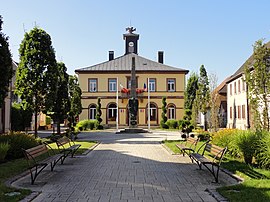world.wikisort.org - France
Seltz (French pronunciation: [sɛlts]; German: Selz) is a commune in the Bas-Rhin department of the Grand Est region in north-eastern France.[3] It is located on the Sauer river near its confluence with the Rhine, opposite the German town of Rastatt.
This article may be expanded with text translated from the corresponding article in French. (December 2008) Click [show] for important translation instructions.
|
Seltz | |
|---|---|
Commune | |
 The town hall in Seltz | |
 Coat of arms | |
Location of Seltz  | |
 Seltz  Seltz | |
| Coordinates: 48°54′N 8°07′E | |
| Country | France |
| Region | Grand Est |
| Department | Bas-Rhin |
| Arrondissement | Haguenau-Wissembourg |
| Canton | Wissembourg |
| Government | |
| • Mayor (2020–2026) | Jean-Luc Ball[1] |
| Area 1 | 21 km2 (8 sq mi) |
| Population | 3,162 |
| • Density | 150/km2 (390/sq mi) |
| Time zone | UTC+01:00 (CET) |
| • Summer (DST) | UTC+02:00 (CEST) |
| INSEE/Postal code | 67463 /67470 |
| Elevation | 107–165 m (351–541 ft) |
| 1 French Land Register data, which excludes lakes, ponds, glaciers > 1 km2 (0.386 sq mi or 247 acres) and river estuaries. | |
History
The former Celtic settlement of Saliso near a crossing of the Rhine river was mentioned as the Roman castrum Saletio in the Notitia Dignitatum about 425. Later a part of the German stem duchy of Swabia, Emperor Otto I granted the area to his wife Adelaide of Burgundy in 968. Saint Adelaide established Selz Abbey in 991 and died here eight years later.
In 1357 Emperor Charles IV of Luxembourg raised Selz to an Imperial city, after which the town joined the Alsatian Décapole league. It however lost its immediate status in 1414, when it was mediatised by Elector Palatine Louis III of Wittelsbach. Seltz finally was annexed by France in 1680.
Landmarks
Église Saint-Étienne de Seltz was last built in 1954–6.
Twin Towns - Sister Cities
Seltz is twinned with:
 Obervellach, Austria
Obervellach, Austria Santa Adélia, Brazil
Santa Adélia, Brazil
See also
References
- "Répertoire national des élus: les maires". data.gouv.fr, Plateforme ouverte des données publiques françaises (in French). 2 December 2020.
- "Populations légales 2019". The National Institute of Statistics and Economic Studies. 29 December 2021.
- INSEE commune file
External links
На других языках
[de] Seltz
Seltz (deutsch Selz) ist eine französische Gemeinde mit 3162 Einwohnern (Stand 1. Januar 2019) im Département Bas-Rhin in der Region Grand Est (bis 2015 Elsass). Sie gehört zum Arrondissement Haguenau-Wissembourg und zum Kanton Wissembourg.- [en] Seltz
[es] Seltz
Seltz es una comuna francesa, situada en el departamento de Bajo Rin en la región de Alsacia. La villa de Seltz (Selz en alemán), que debe su nombre al latín (Saletio), fue elegida por los romanos por su situación geográfica y estratégica al borde de Rin. Ubicada al sur de la frontera del imperio (limes), la ciudad cumplía el rol de fortaleza contra los bárbaros.[ru] Сельц (коммуна)
Сельц (фр. Seltz) — коммуна на востоке Франции в регионе Гранд-Эст[1] (бывший Эльзас — Шампань — Арденны — Лотарингия), департамент Нижний Рейн, округ Агно-Висамбур, кантон Висамбур[2]. До марта 2015 года коммуна являлась административным центром одноимённого упразднённого кантона (округ Висамбур).Другой контент может иметь иную лицензию. Перед использованием материалов сайта WikiSort.org внимательно изучите правила лицензирования конкретных элементов наполнения сайта.
WikiSort.org - проект по пересортировке и дополнению контента Википедии
